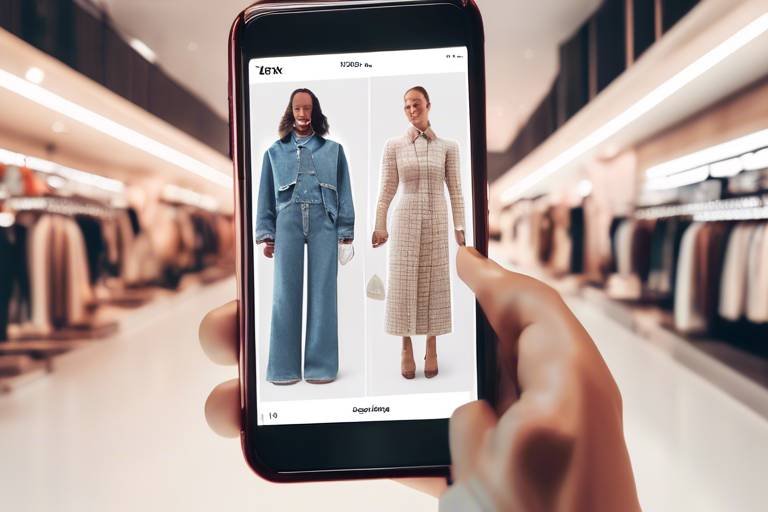AI and the Future of Customized Shopping
In today's fast-paced world, shopping has evolved from a simple necessity into an experience that is tailored to each individual's preferences and needs. Thanks to the rapid advancements in artificial intelligence (AI), the shopping landscape is undergoing a profound transformation. Imagine walking into a store where every product recommendation feels like it was handpicked just for you, or browsing online and finding items that align perfectly with your tastes without having to sift through endless options. This is not a distant dream; it's the reality that AI is creating for consumers and retailers alike.
The integration of AI into the retail sector is revolutionizing how we shop. Retailers are no longer just selling products; they are now curating experiences that resonate with their customers on a personal level. By harnessing the power of data and machine learning, businesses can gain insights into consumer behavior, preferences, and trends, allowing them to provide a more engaging and efficient shopping experience. This shift not only enhances customer satisfaction but also drives sales and fosters brand loyalty.
As we delve deeper into this exciting topic, we will explore how AI is shaping personalized shopping experiences, the mechanics behind data-driven recommendations, and the role of virtual shopping assistants. Furthermore, we will address the challenges and ethical considerations that come with these advancements, ensuring that the future of shopping is not only innovative but also responsible. So, buckle up as we journey into the future of customized shopping powered by AI!
The retail industry has witnessed a remarkable surge in the adoption of AI technologies. From chatbots that provide instant customer service to sophisticated algorithms that optimize inventory management, AI is enhancing every facet of retail operations. Businesses are leveraging AI to engage customers in ways that were previously unimaginable. For instance, AI-driven analytics can predict when a customer is likely to make a purchase, allowing retailers to tailor their marketing strategies accordingly.
Moreover, the use of AI in retail is not limited to large corporations. Small businesses are also beginning to harness these technologies to compete in an increasingly digital marketplace. With tools that analyze customer data and predict trends, even the smallest retailers can offer personalized experiences that rival those of their larger competitors. This democratization of technology is paving the way for a more vibrant and diverse retail environment.
One of the most significant impacts of AI on shopping is its ability to create personalized experiences. AI algorithms analyze consumer behavior to ensure that customers receive recommendations that align with their unique preferences and needs. Imagine walking into a store that recognizes you and suggests products based on your previous purchases or browsing history. This is the power of AI at work, making shopping not just easier but also more enjoyable.
At the heart of personalized shopping experiences lies the mechanics of AI-driven recommendations. These systems utilize data analytics and machine learning algorithms to sift through vast amounts of consumer data, identifying patterns and preferences. For instance, if you frequently purchase eco-friendly products, an AI system will prioritize similar items in your recommendations. This not only saves time but also enhances the likelihood of making a purchase.
Understanding consumer behavior is crucial for AI systems. By analyzing past purchases and browsing history, AI can predict future buying patterns with surprising accuracy. This behavioral analysis allows retailers to anticipate customer needs, ensuring that they are always one step ahead. For example, if a customer regularly buys running shoes, the system might highlight new arrivals in athletic wear, making the shopping experience seamless and intuitive.
Contextual shopping takes personalization a step further by leveraging real-time data. AI utilizes information such as location and time to offer relevant product suggestions. For instance, if you're shopping at a mall during winter, AI might suggest warm clothing or holiday gifts based on seasonal trends. This dynamic approach to shopping not only enhances customer satisfaction but also increases the likelihood of impulse purchases.
AI-powered virtual shopping assistants are another exciting development in the retail landscape. These assistants provide instant support and personalized recommendations, guiding consumers through their shopping journey. Whether it's answering questions about product specifications or suggesting complementary items, virtual assistants enhance the overall shopping experience. They act as a bridge between the consumer and the retailer, ensuring that every interaction is meaningful and relevant.
While the benefits of AI in retail are undeniable, it's essential to address the challenges and ethical considerations that accompany these advancements. As retailers collect vast amounts of consumer data, concerns about data privacy and the potential for bias in AI algorithms arise. Maintaining trust in AI systems is crucial for ensuring long-term success in the retail industry.
As retailers gather extensive consumer data, the importance of protecting customer information cannot be overstated. Shoppers are becoming increasingly aware of their privacy rights, and any breach of trust can lead to significant repercussions for businesses. Retailers must implement robust data protection measures and be transparent about how they use consumer data to maintain trust and loyalty.
Another critical issue is the risk of bias in AI algorithms. If not carefully monitored, AI systems can perpetuate existing biases, leading to unfair treatment of certain consumer groups. It is vital for developers to prioritize transparency and fairness in their algorithms, ensuring that AI-driven shopping solutions are inclusive and equitable for all consumers.
Looking ahead, the future of AI in shopping is brimming with possibilities. As technology continues to evolve, we can expect even more sophisticated AI tools that will further revolutionize the shopping experience. Imagine a world where virtual reality and AI combine to create immersive shopping environments, allowing consumers to try products in a virtual space before making a purchase. The potential for innovation is limitless, and the shopping experience will become increasingly personalized and efficient.
- How does AI personalize my shopping experience?
AI analyzes your past purchases and browsing behavior to provide tailored recommendations that match your preferences. - Are my data privacy concerns valid?
Yes, data privacy is a significant concern, and retailers must implement strict measures to protect your information. - What are virtual shopping assistants?
These are AI-powered tools that assist you during your shopping journey, offering instant support and personalized recommendations. - How can retailers avoid algorithmic bias?
By prioritizing transparency and fairness in the development of AI algorithms, retailers can ensure equitable treatment for all consumers.

The Rise of AI in Retail
Artificial Intelligence (AI) is not just a buzzword; it’s a game-changer in the retail sector, revolutionizing the way businesses operate and engage with their customers. Imagine walking into a store where the shelves seem to know exactly what you want, or shopping online and being greeted by a personalized interface that feels like it was designed just for you. This is the power of AI, and it’s rapidly becoming an integral part of the retail landscape.
With the rise of e-commerce and the increasing demand for personalized shopping experiences, retailers are turning to AI technologies to enhance customer engagement and streamline operations. By implementing AI, businesses can analyze vast amounts of data to understand consumer behavior, predict trends, and optimize inventory management. This not only improves the shopping experience for customers but also drives efficiency and profitability for retailers.
Retailers are leveraging AI in various ways, including:
- Chatbots: These AI-driven assistants provide instant support, answering customer queries and guiding them through the purchasing process, thus improving customer satisfaction.
- Inventory Management: AI systems analyze sales data and predict stock levels, ensuring that popular items are always available while minimizing overstock.
- Dynamic Pricing: AI algorithms adjust prices in real-time based on demand, competition, and other market factors, helping retailers maximize their profits.
Moreover, the integration of AI is not limited to online shopping. In brick-and-mortar stores, AI technologies like facial recognition and in-store analytics are being used to enhance the customer experience. For instance, smart mirrors in clothing stores can suggest outfits based on the items a customer is trying on, while digital price tags can update in real-time, reflecting the latest promotions.
As we move forward, the adoption of AI in retail is expected to grow exponentially. According to a recent report, the global AI in retail market is projected to reach $19.9 billion by 2027, growing at a staggering 34.9% CAGR (Compound Annual Growth Rate). This growth is fueled by the increasing need for efficiency and personalization in the shopping experience.
In conclusion, the rise of AI in retail is transforming the industry in ways we never thought possible. By harnessing the power of data and innovative technologies, retailers can create a more engaging and efficient shopping experience that meets the evolving needs of consumers. The future of retail is here, and it’s powered by AI.

Personalized Shopping Experiences
In today's fast-paced world, consumers are inundated with choices, making the shopping experience both exciting and overwhelming. Enter artificial intelligence (AI), the game-changer that is reshaping how we shop. Imagine walking into a store or browsing online, and instead of sifting through countless products, you are greeted with personalized recommendations that feel tailor-made just for you. This is the magic of AI, and it’s transforming the shopping landscape in ways we never thought possible.
AI algorithms analyze consumer behavior to create these tailored shopping experiences. By examining your preferences, purchase history, and even your browsing habits, AI can predict what you might want next. For instance, if you frequently buy sports gear, the system will prioritize showing you the latest releases in that category. This not only saves you time but also enhances your overall shopping experience, making it feel more intuitive and engaging.
At the heart of personalized shopping experiences lies the power of data-driven recommendations. AI leverages vast amounts of data to understand consumer patterns and preferences. Think of it as having a personal shopper who knows your style inside and out. The mechanics behind this involve sophisticated data analytics and machine learning algorithms that work in tandem to analyze your behavior. These algorithms sift through countless data points, from your past purchases to your social media interactions, to curate a list of products that are most likely to catch your eye.
Understanding consumer behavior is crucial for AI systems. By analyzing your past purchases and browsing history, AI can predict future buying patterns with remarkable accuracy. For example, if you often buy organic food, the system will suggest similar products or brands that align with your preferences. This is not just a shot in the dark; it’s a calculated approach that enhances the likelihood of a purchase. The more you engage with the platform, the better it gets at serving you.
Another fascinating aspect of AI in personalized shopping is contextual shopping. This concept takes personalization a step further by leveraging real-time data. Imagine you’re walking through a mall, and your shopping app sends you a notification about a sale on shoes at a nearby store. This is contextual shopping in action—AI utilizes your location and the time of day to offer relevant product suggestions. It’s like having a shopping assistant who knows exactly what you need, right when you need it!
AI-powered virtual assistants are also playing a pivotal role in enhancing the shopping journey. These digital helpers provide instant support and personalized recommendations, making the shopping experience seamless. Whether you have a question about a product or need help finding the best deals, virtual assistants are available 24/7 to assist you. They can even guide you through the purchasing process, ensuring that you find exactly what you're looking for without any hassle.
As we move forward, the integration of AI in personalized shopping experiences will continue to evolve. Retailers will leverage these technologies not just to meet consumer demands but to anticipate them. The future of shopping is not just about buying products; it's about creating an experience that resonates with each individual. So, the next time you receive a personalized recommendation, remember that there’s a sophisticated AI system working behind the scenes, dedicated to making your shopping journey as enjoyable and efficient as possible.
- How does AI personalize my shopping experience?
AI analyzes your past purchases, browsing history, and preferences to provide tailored product recommendations. - What data does AI use to make recommendations?
AI uses a variety of data points, including purchase history, browsing behavior, and sometimes social media interactions. - Are my data and privacy protected when using AI shopping assistants?
Most retailers are committed to protecting customer data and ensuring transparency in how data is used. - Can I opt out of personalized recommendations?
Yes, most platforms offer settings that allow you to manage your preferences regarding personalized content.

Data-Driven Recommendations
In the fast-paced world of retail, staying ahead of consumer preferences is like trying to catch a moving train. This is where come into play, revolutionizing how shoppers discover products. Imagine walking into a store where every item feels handpicked just for you; that's the magic of AI at work. By analyzing a plethora of data points, AI algorithms can predict what you might want before you even realize it yourself. This not only enhances the shopping experience but also drives sales for retailers.
At the heart of these recommendations lies a sophisticated blend of data analytics and machine learning. These technologies work in tandem to sift through mountains of consumer data, identifying patterns and trends that inform personalized suggestions. For instance, if you frequently purchase organic products or have shown interest in eco-friendly brands, AI can highlight similar items that align with your values and preferences. This creates a seamless shopping experience that feels intuitive and tailored.
To illustrate how data-driven recommendations function, consider the following key components:
- Purchase History: AI systems analyze your past purchases to predict future needs. If you bought a pair of running shoes last spring, the system might suggest new athletic gear as summer approaches.
- Browsing Behavior: Every click, hover, and scroll is tracked. If you spend time looking at a particular category, like home decor, expect to see more recommendations in that area.
- Social Proof: AI can also consider what similar customers are purchasing. If many people who bought a product you viewed also bought another item, that item may be recommended to you.
Moreover, the power of contextual awareness cannot be understated. AI can utilize real-time data to refine its recommendations based on various factors, such as your current location or the time of day. For instance, if you're browsing a grocery app on a Sunday afternoon, the AI might suggest recipes or meal kits that cater to your weekend cooking plans. This level of personalization transforms shopping from a mundane task into an engaging experience that feels relevant and timely.
Ultimately, data-driven recommendations are not just about selling more products; they are about creating a shopping journey that feels uniquely yours. As retailers continue to harness the power of AI, the shopping landscape will evolve, making it easier for consumers to find exactly what they need, often before they even know they need it. This fusion of technology and consumer behavior is paving the way for a future where shopping is not just efficient but also incredibly personalized.
- How does AI know my preferences? AI analyzes your past purchases, browsing history, and behavior on the platform to tailor recommendations.
- Is my data safe with AI-driven systems? While AI systems collect data, reputable retailers prioritize data security and privacy, ensuring your information is protected.
- Can AI recommendations improve over time? Absolutely! The more you interact with the system, the better it becomes at understanding your preferences.

Behavioral Analysis
Understanding consumer behavior is a cornerstone of effective AI systems in the retail sector. Imagine walking into a store where the staff knows exactly what you’re looking for before you even say a word. That’s the magic of behavioral analysis powered by artificial intelligence! By meticulously examining past purchases, browsing history, and even social media interactions, AI can predict future buying patterns with astonishing accuracy.
At its core, behavioral analysis involves collecting and interpreting vast amounts of data. This data can be categorized into several types, including:
- Purchase History: What have customers bought in the past? This data helps in predicting future purchases.
- Browsing Behavior: How do customers navigate through a website? Tracking clicks and time spent on pages reveals interests and preferences.
- Engagement Metrics: How often do customers interact with marketing materials? This helps in understanding which promotions resonate most.
Once this data is gathered, sophisticated machine learning algorithms come into play. These algorithms analyze patterns and trends, allowing retailers to segment customers into distinct groups based on their shopping behaviors. For instance, a customer who frequently buys organic products may be identified as health-conscious, leading to targeted marketing strategies that cater specifically to their interests.
Moreover, behavioral analysis isn’t just about understanding what customers buy; it’s about predicting what they might want next. For example, if a consumer recently purchased a new smartphone, AI can recommend accessories, such as cases or screen protectors, based on the typical buying patterns of similar customers. This not only enhances the shopping experience but also increases sales for retailers.
However, it’s essential to recognize that while AI can offer tailored recommendations, it is the interpretation of this data that ultimately drives success. Retailers must ensure they are utilizing ethical practices when handling consumer data, maintaining transparency, and building trust with their customers. After all, a personalized shopping experience should never come at the cost of privacy.
In conclusion, behavioral analysis powered by AI is redefining the shopping landscape. By leveraging consumer data effectively, retailers can create a shopping experience that feels uniquely tailored to each individual, transforming casual shoppers into loyal customers.
- What is behavioral analysis in retail? Behavioral analysis in retail refers to the process of examining consumer data to understand purchasing habits and preferences, allowing for personalized shopping experiences.
- How does AI enhance behavioral analysis? AI enhances behavioral analysis by using machine learning algorithms to identify patterns in consumer data, predicting future buying behaviors and preferences.
- Is my data safe when retailers use AI for behavioral analysis? While retailers are required to follow data protection regulations, it’s crucial for consumers to ensure that their data is being handled ethically and securely.

Contextual Shopping
In the fast-paced world of retail, is emerging as a game changer, offering consumers a shopping experience that feels as if it’s been tailored just for them. Imagine walking into your favorite store, and the moment you step through the door, your phone buzzes with personalized offers based on your location, the time of day, and even your past shopping habits. This is the essence of contextual shopping—it’s about leveraging real-time data to create a seamless and relevant shopping experience.
At its core, contextual shopping utilizes advanced AI algorithms to analyze various factors that influence purchasing decisions. For instance, if you’re at a coffee shop on a chilly morning, you might receive a notification for a warm beverage from a nearby café, complete with a special discount. This is not just convenient; it’s a way to make shopping feel more intuitive and aligned with your immediate needs. The beauty of AI lies in its ability to sift through mountains of data and pinpoint what might resonate with you at any given moment.
To better understand how contextual shopping works, let’s break down some key elements that AI considers:
- Location: By using GPS and location-based services, retailers can send targeted promotions to customers who are nearby, increasing the chances of in-store visits.
- Time: Time-sensitive offers can create urgency. For example, a flash sale that lasts only a few hours can entice customers to make quick decisions.
- Weather: Retailers can adjust their marketing strategies based on weather conditions. A sunny day might prompt promotions for outdoor gear, while a rainy day could lead to discounts on cozy indoor items.
The implications of contextual shopping extend beyond just enhancing consumer experience. For retailers, it means improved customer engagement and higher conversion rates. When customers receive offers that are relevant to their current situation, they are more likely to make a purchase. This strategy not only boosts sales but also fosters customer loyalty, as shoppers begin to associate the brand with a personalized and thoughtful shopping journey.
Moreover, contextual shopping can help retailers manage their inventory more effectively. By analyzing trends and consumer behavior in real-time, businesses can adjust their stock levels accordingly, ensuring that popular items are readily available when demand peaks. This agility in operations is crucial in today’s competitive landscape, where consumer preferences can shift rapidly.
In conclusion, contextual shopping is not just a trend; it’s the future of retail. By harnessing the power of AI and real-time data, retailers can create a shopping experience that is not only personalized but also incredibly relevant. As consumers, we can look forward to a time when shopping feels less like a chore and more like a tailored experience that caters to our individual needs at any moment.

Virtual Shopping Assistants
In today's fast-paced world, have become an essential part of the online shopping experience. Imagine walking into a store where a friendly assistant immediately knows your preferences, suggests the perfect items, and helps you navigate through the aisles. This is precisely what AI-powered shopping assistants aim to replicate in the digital realm. By utilizing advanced algorithms and natural language processing, these assistants can provide instant support, making your shopping journey not only easier but also more enjoyable.
One of the most fascinating aspects of virtual shopping assistants is their ability to engage with customers in real-time. Whether you're browsing a website or using a mobile app, these assistants can pop up to answer questions, provide recommendations, and even assist with checkout processes. It's like having a personal shopper available 24/7, ready to cater to your needs at any moment. This level of convenience is a game-changer for consumers who appreciate quick and efficient service.
Furthermore, virtual shopping assistants can analyze your shopping history and preferences to offer highly personalized recommendations. For instance, if you frequently purchase running shoes, the assistant might suggest the latest models or even notify you of upcoming sales. This tailored approach not only enhances the shopping experience but also increases the likelihood of making a purchase. In fact, studies have shown that personalized recommendations can boost sales by as much as 30%.
But how do these virtual assistants work their magic? At the core, they rely on a combination of machine learning and data analytics. By examining vast amounts of consumer data, they can identify patterns and trends, allowing them to predict what products a customer might be interested in. Additionally, they can learn from user interactions, continuously improving their suggestions over time. This creates a feedback loop that benefits both the consumer and the retailer.
However, it's important to note that the effectiveness of virtual shopping assistants hinges on the quality of the data they have access to. If the data is inaccurate or biased, the recommendations may not resonate with consumers. Therefore, retailers must prioritize data integrity and invest in robust systems to ensure their assistants are providing valuable insights.
Moreover, the integration of virtual shopping assistants into retail platforms can lead to significant operational efficiencies. By automating customer service inquiries and streamlining the shopping process, retailers can reduce overhead costs and allocate resources more effectively. This not only enhances the bottom line but also allows human staff to focus on more complex tasks that require a personal touch.
As we look to the future, it's clear that virtual shopping assistants will continue to evolve. With advancements in AI technology, we can expect even more sophisticated interactions that mimic human-like conversations. This will further blur the lines between online and in-store shopping experiences, making it easier than ever for consumers to find exactly what they need, when they need it.
In conclusion, virtual shopping assistants are revolutionizing the way we shop. They are not just tools; they are companions in the shopping journey, providing personalized support that enhances the overall experience. As technology continues to advance, these assistants will become even more integral to the retail landscape, shaping the future of how we discover and purchase products.
- What are virtual shopping assistants?
Virtual shopping assistants are AI-powered tools that help customers find products, answer questions, and provide personalized recommendations during their shopping experience. - How do virtual shopping assistants enhance the shopping experience?
They offer real-time support, analyze shopping behavior to provide tailored recommendations, and streamline the purchasing process. - Are virtual shopping assistants effective in increasing sales?
Yes, personalized recommendations from these assistants can significantly boost sales, with studies indicating increases of up to 30%. - What technology powers virtual shopping assistants?
They primarily rely on machine learning and data analytics to understand consumer preferences and improve their suggestions over time.

Challenges and Ethical Considerations
As we dive deeper into the world of artificial intelligence and its impact on shopping, it's crucial to acknowledge the that accompany these advancements. While AI offers numerous benefits—like personalized shopping experiences and enhanced customer engagement—it also raises significant concerns that cannot be overlooked. One major issue revolves around data privacy. With retailers collecting vast amounts of consumer data to tailor experiences, the question arises: how secure is this information? Consumers are becoming increasingly aware of their data rights, and any breach can lead to a loss of trust that can be detrimental to a brand's reputation.
Furthermore, the ethical implications of AI extend beyond just privacy. There is a growing concern regarding algorithmic bias. AI systems learn from historical data, and if that data reflects societal biases, the algorithms can inadvertently perpetuate these biases in their recommendations and decisions. For instance, if an AI system is trained on data that predominantly features a specific demographic, it may struggle to provide fair and equitable service to a more diverse audience. This can lead to a discriminatory shopping experience, alienating segments of the consumer base. To combat these issues, transparency in AI development and implementation is paramount.
Retailers must prioritize the ethical use of AI by establishing clear guidelines on data collection and usage. Additionally, they should actively work on minimizing bias in their algorithms. This can include diversifying training datasets and continuously monitoring AI outputs to ensure fairness. Moreover, it’s essential for companies to engage in open dialogues with consumers about how their data is being used and the measures in place to protect it. By fostering a culture of transparency and accountability, businesses can build trust and pave the way for a more ethical future in AI-driven shopping.
- What are the main ethical concerns regarding AI in shopping?
The primary concerns include data privacy and algorithmic bias, which can affect how consumers are treated and how their data is managed. - How can retailers ensure data privacy?
Retailers can ensure data privacy by implementing robust security measures, being transparent about data usage, and adhering to regulations such as GDPR. - What steps can be taken to address algorithmic bias?
To address algorithmic bias, companies should diversify their training data and regularly audit their AI systems to ensure fairness and accuracy.

Data Privacy Concerns
As we dive deeper into the world of AI and customized shopping, one critical issue looms large: data privacy. With retailers harnessing the power of artificial intelligence to enhance the shopping experience, they are also collecting an unprecedented amount of consumer data. This data can include everything from personal preferences and purchase history to sensitive information like payment details and location. The question arises: how safe is this information, and what measures are in place to protect it?
Consumers today are more aware than ever of their data privacy rights. They want to know who has access to their information, how it is being used, and whether it is secure. The potential for data breaches and misuse of personal information creates a significant barrier to trust between consumers and retailers. In fact, a recent study revealed that 70% of consumers are concerned about their data privacy when shopping online. This statistic underscores the importance of transparency and accountability in the use of AI technologies.
To address these concerns, many retailers are now implementing robust data protection strategies. These strategies often include:
- Encryption: Encrypting sensitive data to ensure that it remains secure even if accessed by unauthorized parties.
- Access Controls: Limiting access to consumer data to only those employees who need it for their job functions.
- Regular Audits: Conducting frequent audits to identify any vulnerabilities in data handling practices.
- Consumer Consent: Ensuring that consumers provide informed consent before their data is collected and used.
Moreover, regulatory frameworks like the General Data Protection Regulation (GDPR) in Europe and the California Consumer Privacy Act (CCPA) in the United States are setting strict guidelines for how businesses should handle consumer data. These regulations not only protect consumers but also encourage businesses to be more ethical in their data practices. Retailers that prioritize data privacy are likely to gain consumer trust, which can translate into increased loyalty and sales.
However, the journey toward complete data privacy is fraught with challenges. As AI systems evolve, so do the tactics of those who wish to exploit vulnerabilities in these systems. The threat of data breaches looms large, and the potential for misuse of consumer data remains a pressing concern. It’s essential for retailers to stay ahead of these threats by continuously updating their security measures and staying informed about the latest developments in data privacy laws.
In conclusion, while AI has the potential to revolutionize shopping experiences, it is crucial for retailers to navigate the complex landscape of data privacy with care. By prioritizing the protection of consumer information, businesses can not only comply with legal requirements but also foster a relationship of trust and transparency with their customers. After all, in a world where data is currency, safeguarding that currency is paramount.
- What is data privacy in the context of AI and shopping?
Data privacy refers to the handling and protection of personal information collected by retailers through AI technologies, ensuring that consumer data is secure and used ethically. - How can consumers protect their data while shopping online?
Consumers can protect their data by shopping on secure websites, using strong passwords, and being cautious about sharing personal information. - What laws govern data privacy in retail?
Regulations like GDPR and CCPA set guidelines for how businesses should collect, store, and use consumer data to protect privacy rights.

Addressing Algorithmic Bias
In the rapidly evolving world of artificial intelligence, algorithmic bias has emerged as a significant concern that can undermine the very benefits AI aims to provide. As AI systems become more integrated into our shopping experiences, it’s crucial to recognize that these algorithms are not infallible. They learn from data, and if that data reflects existing biases—whether societal, racial, or gender-based—the recommendations and decisions made by AI can perpetuate these biases, leading to unfair treatment of certain consumer groups.
Imagine walking into a store where the products you see are based not on your preferences but on a narrow set of data that overlooks your unique needs. This scenario is a reality for many consumers when AI algorithms fail to account for diversity in their training data. For example, if an AI system is primarily trained on data from a specific demographic, it may inadvertently exclude or misrepresent others. This not only affects the shopping experience but can also lead to significant ethical dilemmas for retailers.
To address these challenges, it is vital for companies to prioritize transparency and fairness in their AI development processes. This can involve several strategies:
- Diverse Data Sets: Ensuring that the training data encompasses a wide range of demographics can help mitigate bias. This means actively seeking out data from underrepresented groups.
- Regular Audits: Conducting periodic evaluations of AI algorithms to identify and rectify any biases that may have developed over time.
- Inclusive Design: Involving diverse teams in the design and development of AI systems can lead to more equitable outcomes.
Furthermore, fostering a culture of accountability within organizations is essential. Retailers should not only acknowledge the potential for bias but also take proactive steps to educate their teams about its implications. By creating an environment where employees are encouraged to question and analyze AI outputs, companies can work towards more ethical AI practices.
Ultimately, addressing algorithmic bias is not just about improving the shopping experience; it’s about building trust with consumers. When shoppers feel that they are being treated fairly and that their unique needs are understood, they are more likely to engage with brands and make repeat purchases. In a world where personalization is key, ensuring that AI systems are free from bias is not just a moral obligation—it’s a strategic advantage.
- What is algorithmic bias? Algorithmic bias refers to systematic and unfair discrimination that occurs when an AI system produces results that are prejudiced due to flawed assumptions in the machine learning process.
- How can retailers prevent algorithmic bias? Retailers can prevent algorithmic bias by using diverse data sets, conducting regular audits, and fostering inclusive design practices.
- Why is addressing algorithmic bias important? Addressing algorithmic bias is crucial for ensuring fairness in consumer treatment, building trust with customers, and enhancing the overall shopping experience.

The Future of AI in Shopping
The future of shopping is poised to be a thrilling journey, one that intertwines the fabric of technology with our daily lives. Imagine walking into a store where every aisle feels like it was designed just for you, where products practically leap off the shelves because they know your preferences better than you do. This is not science fiction; it’s the reality that artificial intelligence is crafting for consumers and retailers alike. As we look ahead, we can expect AI to revolutionize the shopping experience in ways we can only begin to fathom.
One of the most exciting prospects is the advancement of hyper-personalization. AI algorithms will become increasingly sophisticated, analyzing not just past purchases but also real-time data from various sources. For instance, imagine an AI system that takes into account your social media activity, current trends, and even the weather to suggest items that you might want to buy. This level of personalization will make shopping feel less like a chore and more like a curated experience, tailored to your unique lifestyle.
Moreover, the integration of augmented reality (AR) with AI will change how we interact with products. Picture this: you’re at home, and instead of scrolling through endless product pages, you can use your smartphone or AR glasses to visualize how a piece of furniture would look in your living room. AI will analyze your space and provide recommendations based on your style and preferences, making the decision-making process not only easier but also more enjoyable.
Another significant development will be the rise of AI-driven supply chain management. Retailers will leverage AI to predict demand more accurately, ensuring that popular products are always in stock. This means fewer disappointments for consumers and a more efficient shopping experience overall. With AI monitoring trends and consumer behavior, retailers can respond swiftly to changes in demand, optimizing inventory levels and reducing waste.
As we move forward, we can also expect to see the emergence of seamless omni-channel experiences. AI will enable retailers to unify their online and offline platforms, allowing consumers to switch between browsing on their phones and shopping in-store without missing a beat. Imagine starting your shopping journey on your smartphone, receiving personalized recommendations, and then walking into a store where your preferences are already known. This level of integration will enhance customer satisfaction and loyalty.
However, as we embrace these advancements, it’s crucial to remain mindful of the ethical implications that come with them. With AI’s ability to collect and analyze vast amounts of data, concerns around data privacy will continue to grow. It will be essential for retailers to prioritize transparency and build trust with their customers. Consumers will need assurances that their data is being handled responsibly and ethically.
As we envision the future of AI in shopping, it’s clear that the possibilities are both exciting and vast. From hyper-personalized experiences to the seamless integration of technology in our shopping journeys, AI is set to redefine how we interact with retailers. The ultimate goal is to create a shopping environment that is not just efficient but also enjoyable, where every interaction feels meaningful and tailored to individual needs.
- How will AI improve the shopping experience? AI will enhance personalization, streamline operations, and provide real-time recommendations based on consumer behavior.
- What are the ethical concerns regarding AI in shopping? Data privacy and algorithmic bias are significant concerns that need to be addressed to maintain consumer trust.
- Will AI take away jobs in retail? While AI will automate certain tasks, it will also create new opportunities and roles focused on managing and interpreting AI-driven insights.
- How can consumers ensure their data is protected? Consumers should look for retailers that prioritize transparency in data collection practices and offer clear privacy policies.
Frequently Asked Questions
- How is AI changing the shopping experience?
AI is revolutionizing the shopping experience by providing personalized recommendations, enhancing customer engagement, and streamlining operations for retailers. With AI's ability to analyze consumer behavior and preferences, shoppers receive tailored product suggestions, making their shopping journey more enjoyable and efficient.
- What are data-driven recommendations?
Data-driven recommendations are suggestions generated by AI algorithms that analyze a customer's past purchases, browsing history, and preferences. By leveraging data analytics and machine learning, these recommendations ensure that consumers see products that align with their interests, increasing the likelihood of a purchase.
- How does AI analyze consumer behavior?
AI analyzes consumer behavior by examining various data points, including previous purchases, browsing habits, and even demographic information. This analysis helps AI systems predict future buying patterns, allowing retailers to offer products that meet the evolving needs of their customers.
- What is contextual shopping?
Contextual shopping refers to the practice of using real-time data, such as location and time, to enhance the shopping experience. AI utilizes this information to provide relevant product suggestions, ensuring that customers receive offers that are timely and appropriate for their current situation.
- What role do virtual shopping assistants play?
Virtual shopping assistants, powered by AI, provide instant support and personalized recommendations to consumers. They enhance the shopping journey by answering questions, assisting with product searches, and guiding customers through the purchasing process, making shopping more convenient and enjoyable.
- What are the ethical concerns associated with AI in retail?
While AI offers many benefits, there are ethical concerns, particularly regarding data privacy and algorithmic bias. Retailers must ensure that customer data is protected and that AI systems are designed to be fair and transparent, avoiding discrimination or bias in product recommendations.
- How can retailers protect customer data?
Retailers can protect customer data by implementing robust security measures, such as encryption, access controls, and regular audits. It's also essential to have clear privacy policies in place and to communicate transparently with customers about how their data is collected and used.
- What is algorithmic bias, and why is it a concern?
Algorithmic bias occurs when AI systems produce unfair or discriminatory outcomes due to flawed data or design. This is a concern because it can lead to unequal treatment of consumers based on race, gender, or other factors, undermining trust in AI-driven solutions and potentially harming businesses.
- What does the future hold for AI in shopping?
The future of AI in shopping looks promising, with advancements expected to further personalize the shopping experience. Innovations could include even smarter virtual assistants, enhanced predictive analytics, and more immersive shopping experiences, making retail more engaging and tailored to individual preferences.



















